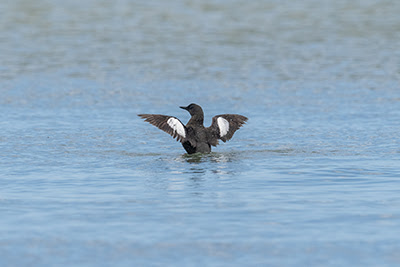Years ago, probably more than I care to remember, when I was only 8 or 9 I started reading my Dad's 'Romany' books. Written by 'Romany', or George Bramwell Evens, they were about his travels throughout the UK in his old vardo or wooden romany caravan along with his horse, Comma, and his spaniel Raq. Although written in the 920's and 30's I loved these books and read and re-read them until they fell to bits! They were beautifully written and followed his adventures observing the natural world around him whether it be Curlews on the moors (Out with Romany by moor & dale) or seabirds on their cliffs (Out with Romany by the Sea).
See here for a link to Romany.
One of the many things I remember is his description of a 'Storm Cock' singing from the top branches of a tree in a gale. Storm Cock was the old English country name given to the Mistle Thrush. One of our earliest breeders the male is often heard proclaiming his territory in January or February.
They're not often caught and ringed and I'd never seen one in the hand before. I think the Merseyside Ringing Group only ringed 2 in the whole of 2014 and since the inception of bird ringing in 1909 less than 50,000 have been ringed natioanlly.
Imagine my suprise when the first bird out of the mist net at Barry's on Friday was a lovely Storm Cock. Luckily John had ringed one before so I had the pleasure of ringing it. As well as a first for me it was a first for Barry's although we regularly hear them and see them both in and around the garden!
They're a big bird in the hand! This one was aged as a 2nd calendar year bird.
Although we didn't catch as many birds as usual it was steady and there was time to explain some of the ageing techniques in more detail with the trainees present.
Unfortunately we caught several Chaffinches with the dreaded 'scaly foot' including this unfortunate male.
We also caught a female who seemed to be getting over the disease. The tarsus were thickened and she'd lost a hind toe but the scaliness had disappeared. I don't know if its possible for birds to recover from this disease but she certainly appeared to have done.
Once again, many thanks to Barry for letting us ring in his garden and to John for the organisation.
9 Mar 2015
Subscribe to:
Post Comments
(
Atom
)





























































No comments :
Post a Comment